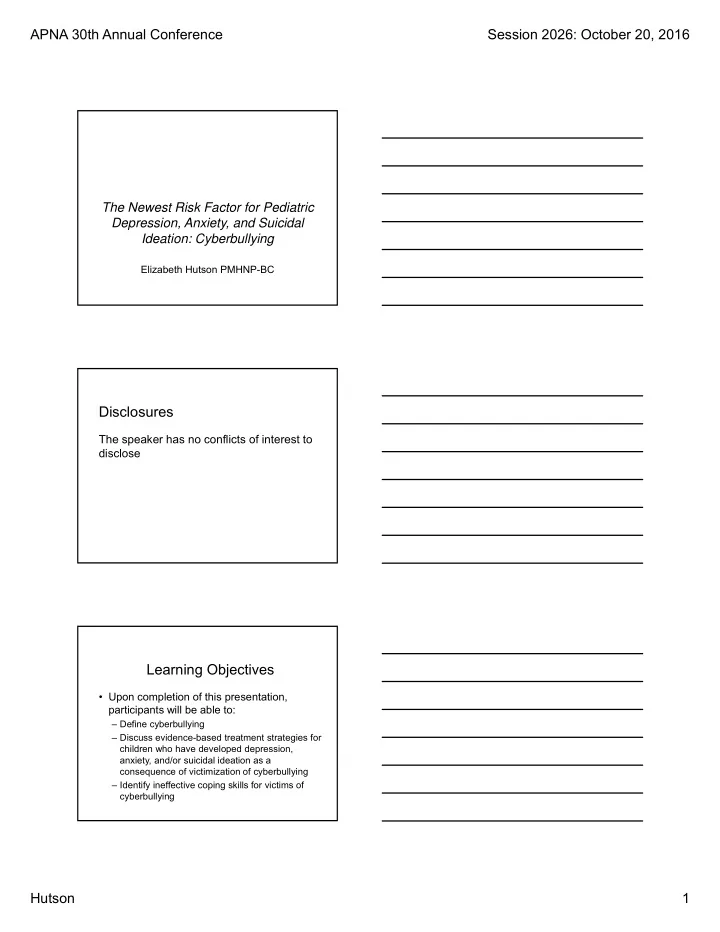

APNA 30th Annual Conference Session 2026: October 20, 2016 The Newest Risk Factor for Pediatric Depression, Anxiety, and Suicidal Ideation: Cyberbullying Elizabeth Hutson PMHNP-BC Disclosures The speaker has no conflicts of interest to disclose Learning Objectives • Upon completion of this presentation, participants will be able to: – Define cyberbullying – Discuss evidence-based treatment strategies for children who have developed depression, anxiety, and/or suicidal ideation as a consequence of victimization of cyberbullying – Identify ineffective coping skills for victims of cyberbullying Hutson 1
APNA 30th Annual Conference Session 2026: October 20, 2016 Definition of Cyberbullying “ Willful and repeated harm inflicted through aggressive actions through the use of computers, cell phones, and other electronic devices ” Hutson, 2016 Defining Attributes of Cyberbullying • Aggressive Action • Electronic mean of contact • Intent • Harm 24/7 • Repetition Not included: Power Differential Hutson, 2016 Background • Victim of Cyberbullying • 25% of children • Perpetrator of Cyberbullying • 16% of children • 40% - 55% of students are involved in some way • as victims, perpetrators, or observers/bystanders Palladino, Nocentini, & Menesini, 2012 Hutson 2
APNA 30th Annual Conference Session 2026: October 20, 2016 Consequences (and Antecedents) of Cyberbullying • Depression • Anxiety • Suicidal Ideation Is Cyberbullying Worse than Tradition Bullying? • Certain types of cyberbullying lead to greater emotional distress • When an adult is involved as perpetrator • When pictures are posted • When the bullying carries over into traditional bullying • Suicidal Ideation • More prevalent from cyberbullying versus traditional bullying • Victims are 8X more likely to bring a weapon to school Bottino et al., 2015; Ybarra, Diener-West, & Leaf, 2007 Case Study • 13-year-old female who presents with depression, social anxiety, NSSI and SI • First bullied in person in 5 th grade • Kids would call her “Crusty” or “Pizza” • Cyberbullied in 7 th grade on Instagram • Created a fake account with her picture • Switched schools, but the in-person and cyberbullying continued Hutson 3
APNA 30th Annual Conference Session 2026: October 20, 2016 What do you think she should do? • Tell her teachers or school administrators 😦 • Tell her parents 😄 • Take away/take a break from electronics 😄 • Tell a friend 😦 • Tell the police • Ignore the behavior 😦 • Confront the bully 😦 • Go to counseling 😄 What does the evidence say she should do? 1800 Titles PUBMED, CINAHL, Psychinfo, Eric, Medline, Communication and Cyberbullying + Intervention OR Treatment OR Therapy OR Mass Media Complete: Program 281 Abstracts 31 Articles 19 articles selected with 14 unique programs Psychoeducation Parent Education Adult you trust Involvement in Consequences Collaborative Peer Mentors Talking to an with students Coping Skills Social Skills Bystanders Citizenship incidents Empathy Teacher Digital Legal NoTrap! X X X X X X X Media Heros X X X X X X X X X Tabby X X X X X X X X X CFSP X X X X X X X X X X Cyberprogram 2.0 X X X X X X ViSC X X X X X X ConRed X X X X X X X X KiVa X X X X X X X X X X X P4C X X X SDPaCB X X X X WebQuest X X X X Arizona A.G. X X X iZ Heros X X X X School ‐ Based X X X Hutson 4
APNA 30th Annual Conference Session 2026: October 20, 2016 EBP: Schools • Whole school approach • Specific guidelines for teachers to address bullying incidents • Collaboration between students • Peer Mentoring • Bystanders EBP: Individuals Things to teach individuals: • Coping Skills • Psychoeducation • Empathy Training • Social Skills • Digital Citizenship • Legal Consequences EBP: Parents • Parent Psychoeducation • Talking to an adult you trust Hutson 5
APNA 30th Annual Conference Session 2026: October 20, 2016 EBP: Healthcare Practitioners None were found Theoretical approaches from CBT • Thinking, Feeling, Behaving Triangle • Cognitive Restructuring of Distortions • ABCs • Positive Self-Talk Melnyk, 2016 (Likely) ineffective coping strategies • Ignoring • Confronting the bully • Telling an unhelpful adult • Taking away electronic devices Fenaughty & Harre ́ , 2013 Hutson 6
APNA 30th Annual Conference Session 2026: October 20, 2016 Future Recommendations • Treatment programs in school that specifically target depression, anxiety, and SI using CBT • Treatment programs that can be implemented in the healthcare provider’s office Hutson 7
Recommend
More recommend